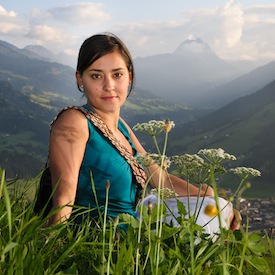Retailers for Responsible Mining: Johanna Mejía

The No Dirty Gold Campaign calls on retailers, from large department stores to small businesses, to sign the “Golden Rules,” pledging to commit to more responsible metals sourcing. Thus far, 94 retailers have signed on to the Golden Rules, and the list continues to grow.
This is one of a series of occasional interviews in which we ask retailers about why they signed the pledge and how they work to implement the Golden Rules in their business. Note that the views expressed by retailers do not necessarily reflect the view of Earthworks.
More profiles can be found on our new NDG site here.
Johanna Mejía, Amalena Jewelry
Raised in Colombia and currently living in Austria, Johanna started out as a financial professional before pursuing a master's degree in Austria, where she wrote her thesis on artisanal gold mining in Colombia and its impacts. Looking for solutions to improve the economic development of people in her home country, she is now building a business of selling gold jewelry that is both sourced and made in Colombia to Austrian markets. Johanna works with a group of seven women in Colombia, who use traditional methods to produce jewelry.
She chatted with me about the inspirations for her business and her commitment to ethical jewelry. In recent years, mining has boomed in Colombia, polluting the environment and often exacerbating conflict.
How did you get started in the jewelry business?
I was working for a broker in the financial industry but I travelled with my husband to isolated places in Colombia and visited indigenous groups. I got to know the Colombia you don't see in the big cities. I visited minority and indigenous groups, and that's when I got to know these artisanal and small-scale miners. They are continuing what they have been doing forever.
They believe the Earth and all the minerals are the blood of Mother Earth. It's a reward for Earth when you work with the materials they provide you, but at the same time you don't cross the limit and abuse the resources Mother Earth provides you.
In addition, there is another area in Colombia that is known for the highest area of mercury contamination, Mirmito. I've visited this area and was shocked by the consequences of mercury contamination. I was always interested in social and environmental issues and thought I could help Colombian people through international trade and fair practices.
How did you get connected with the jewelry makers with whom you work?
When I did my master's thesis on small-scale mining and the initiative for fairmined gold, I found out that Oro Verde was the first initiative working to address these issues. They wanted to give visibility to those miners who don't use mercury and cyanide and help them improve their mining techniques through restoration of the mining area. They also wanted to create a program with the locals, who came there from Africa as slaves. So I visited them to compare the two [types of mining in the area]. One - the illegal mining with no control over those large machines, etc. and the other - these small scale miners who work in these beautiful areas and the whole infrastructure looks really beautiful and seems to be really well-adjusted to the environment.
I do believe my project is an alternative to dirty gold. I think we are doing something going against all those issues -- indigenous, women's issues.
How do you demonstrate commitment to the Golden Rules?
My goal is to give an example to replicate -- to show these communities that people abroad are interested in buying responsible gold. We draw from the Choco region, where they use traditional mining techniques from Africa that uses no mercury or cyanide.. We also do not use any harsh chemicals in the extraction of our gold and follow the ARM and fair trade/fairmined guidelines.
In the community where I work, people involved in mining must be living in the community for at least five years. That creates a social cohesion, which is important because they also work and live near a conflict zone. That's what I would like to replicate.
Tagged with: small scale mining, retailers, no dirty gold, colombia
comments powered by Disqus
Follow Earthworks